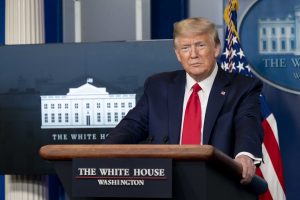The election of Donald Trump to serve another term as president of the United States is sending most countries scrambling to understand the implications for their foreign policies. With Australia’s security ties are heavily bound to the U.S., Trump’s proposed radical realignment of how Washington engages with the world has serious implications for Canberra. There is no shortage of commentary about this currently in the country.
Yet Trump is also a highly influential cultural figure. He is a man who has not only taken a sledgehammer to political norms in the U.S., but whose aggressive populism has the potential to infect other countries. Australians are highly engaged in U.S. politics – the United States is now the dominant cultural influence in the country – so it’s worth thinking about how Trump’s reelection may affect Australia’s domestic politics as it approaches a federal election by May 2025.
Trump himself is not popular in Australia. A Lowy Institute poll in September indicated that only 22 percent of Australians would have preferred Trump to Kamala Harris. If Australians value anything in their politics, it is stability and prudence. Trump’s chaotic personality and radical political agenda are therefore deeply off-putting to most Australians. It is mostly those who think politics is about “upsetting the right people” who find him attractive. There are elements within the Liberal and National parties, as well as the Murdoch press, who have this as their primary motivation too.
Therefore, how much chaos Trump creates in his first three to four months back in the White House will be highly influential. While the current Labor government will have to deal with Trump as responsible stakeholders – and this may taint them – how the public perceives any political alignment with Trump’s actions will ultimately have a significant effect on how they vote.
Yet there are broader lessons from the U.S. election that will also be influential, particularly the major global trend against incumbency. In particular, how high rates of inflation over the past few years has overwhelmed other positive economic indicators.
While employment may be strong in Australia, inflation has a huge psychological impact. People maintain memories of what their regular products cost and expect them to be consistent. Inflation attacks these expectations on every trip to the supermarket, and down every aisle. It’s an insidious frustration machine. While governments may only have limited tools at their disposal to ease this frustration, they become the targets of it because – without overthrowing liberal democracy altogether – market forces can’t be voted against.
Due to the material comfort that most politicians live in – Australian politicians are some of the highest paid in the world – they are rightfully perceived to be insulated from the effects of inflation. Therefore any attempt to express concern about inflation in the country is interpreted as lip service by the public.
Given the nature of the global media environment, cultural issues that were present at the U.S. election may also be influential in Australia. Many of the people whom progressive politics claims to speak for really dislike progressive politics. Rather than grouped into categories, most people want to be seen as individuals, and don’t want to be told that their skin color determines their views. Those who wish to herd demographics together for political narratives will increasingly be faced with voters who will resist such categorization.
The Labor Party has the advantage of much of this kind of progressive politics being attracted to the Greens, but then most of these people’s votes come back to Labor under Australia’s preferential voting system. Yet, like the Democrats in the United States, Labor finds itself unable to articulate exactly what it is for. This lack of clarity is driving working class voters away from it.
Although the party has been able to hold onto most of its traditionally working class seats in the western suburbs of Melbourne and Sydney, its margins are slimming. Unlike in the U.S., there isn’t a realignment of the working class to conservative politics, but a spraying of this vote in multiple different directions. As proved by the western Sydney seat of Fowler at the 2022 election, high quality independent candidates that understand and appeal to these communities can easily strip Labor of its traditional heartland, the same way independents have stripped seven of the country’s 10 wealthiest seats away from the Liberal Party.
It is here where Australia’s distinct political culture diverges from the United States. Rather than radical new political actors capturing a political party the way Trump has, Australians are demonstrating a strong suspicion of political parties altogether, and well-organized independent candidates are taking advantage of this environment.
With a record number of independent MPs elected at the last federal election, it is likely that this number will increase in May. Rather than the chaos and destruction of Trump, Australians are channeling the current distrust and disillusionment in politics throughout the West into more positive and constructive outlets. In the process, they’re creating an entirely new form of political realignment.

































